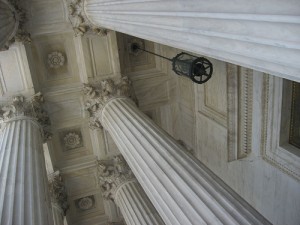30 Jun Monday Morning Review: Local Governments in the Federal Appellate Courts
Here are last week’s published decisions involving local governments:
First Circuit
Snyder v. Gaudet, No. 12-1422 (June 25, 2014) (In 42 U.S.C. 1983 action alleging violation of equal protection because city applied zoning restriction differently to Snyder than to prior owner, granting qualified immunity to defendants because right was not clearly established):
[L]ocal governments make countless decisions every day, many of which inevitably disadvantage someone who can credibly claim that a local official acted out of personal hostility. This is especially so in our smaller cities and towns, where many people know their public officials. State and local law often provides recourse for challenging the imposition of fines or the burdens of administrative rulings by local officials that violate state or local law. So, too, the political process may provide a venue for correcting or deterring abuses. And federal courts obviously play an important role in adjudicating claims that such abuses violate federal law. Where, as here, however, municipal officials did not violate any clearly established federal law, federal law provides no basis for making local government officials pay damages.
Third Circuit
Tearpock-Martini v. Borough of Shickshinny, No. 13-3876 (June 23, 2014) (holding that an Establishment-Clause challenge under 42 U.S.C. 1983 to a still-existing monument on municipal property is not subject to a state-law statute of limitations). See our coverage here.
Hildebrand v. Allegheny County, No. 13-1321 (June 27, 2014) (deciding, among other things, that an employee terminated from County position may not maintain action under 42 U.S.C. 1983 for violation of equal protection, but must proceed under the Age Discrimination in Employment Act).
Seventh Circuit
Cabral v. City of Evansville, No. 13-2914 (June 25, 2014) (ruling that church does not have standing to appeal district court decision concluding that City approval of decorated crosses violates the Establishment Clause).
Eighth Circuit
Nord v. Walsh County, No. 12-3249 (June 26, 2014) (in action claiming that Sheriff fired deputy based on First-Amendment-protected statements that deputy made during campaign, finding that Sheriff is entitled to qualified immunity).
Eleventh Circuit
Hubbard v. Clayton County Sch. Dist., No. 13-12130 (June 27, 2014) (in suit claiming that school district dismissed Hubbard for protected First-Amendment activity, reversing district court’s determination that Hubbard was speaking as an employee).
D.C. Circuit
Edwards v. District of Columbia, No. 13-7063 (June 27, 2014) (reversing grant of summary judment for District in First-Amendment challenge to licensing requirement for tour guides).
(June 23, 2014-June 27, 2014)
Image courtesy of Flickr from Ken Lund (creative-commons license, no changes made).



